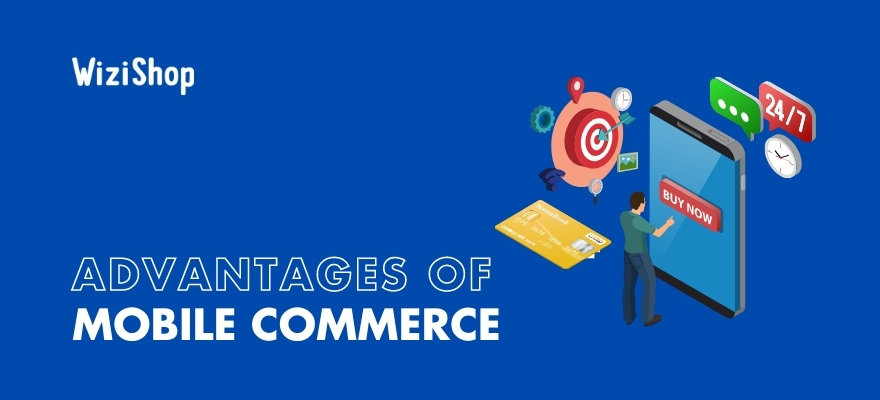If your ecommerce business isn’t actively focusing on mobile commerce, you may be missing out on incredible opportunities for growth and user-experience improvement. Mobile commerce describes buyers’ activities completed through a mobile device.
This includes a mobile application and an internet browser on a mobile device. You may assume that your ecommerce business’s website is all that’s needed for mobile commerce, but a closer look reveals that this isn’t the case.
According to eMarketer, more than half of all UK ecommerce sales in 2021 will be mobile commerce transactions. In addition, approximately half of all online retailers already have a mobile app.
This holds true for both smaller and larger e-retailers. Many others who don’t yet have a mobile app are either developing one now or are preparing to do so.
Why are successful ecommerce businesses focusing heavily on delivering an excellent mobile shopping experience for their customers?
As people increasingly rely on their smartphones and other mobile devices, they’re using them for all kinds of activities. Online retailers are rising to meet the changing behaviors and preferences of shoppers in the hopes of boosting sales.
The future of ecommerce seems to involve mobile commerce increasingly becoming the norm. For this reason, your business may need to make improvements to its operations to meet the modern needs of your customers.
The good news is that mobile commerce also has exciting benefits for your online store.
1. Encourages faster purchases
Page load times and responsiveness impact the user experience and Google search rankings. There are many steps that you can take to improve your site in these areas.
However, mobile apps are usually significantly faster and provide a better browsing experience as a result. One of the reasons for this is intuitive mobile browsing.
Consider that consumers are more likely to click off of a sluggish website and may never return. The ability to quickly engage consumers through your mobile app with products that meet their needs is essential for optimized revenue.
After all, you must keep your customers on your site so that they’ll browse your inventory and make a purchase!
You should also upgrade your site to improve mobile device users’ experience. Some of these upgrades may include improvements to formatting and page load times on mobile devices.
2. Allows you to reach a larger audience
According to Statista, approximately 4.3 billion people around the globe will own and use a smartphone by 2023. This means that your ecommerce shop can potentially be accessed by half of the people on the planet.
Think about the steps that people would need to take to shop at a physical shop. This includes getting there during business hours, spending time physically walking through the store to find items, and standing in line to make the purchase.
Browsing through your store’s inventory online via a smartphone or another mobile device is faster and more convenient. However, shopping on your site with a mobile device still requires the user to search for it or to manually type in the URL.
In contrast, anyone with a smartphone could conveniently download your app as soon as they see a special offer or product that you display. No additional steps are required for billions of shoppers to reach this version of your store and to check out your offerings.
3. Creates a better experience for customers
An ecommerce business’s success is directly linked to the user experience that it provides. This is defined by the speed of the shopping platform, how convenient it is to shop, and how easy the platform is to use.
When your chosen hosting platform allows you to have all the essential functions for ecommerce, you’re able to create a better experience for both desktop and mobile users alike. To further elevate how the customer experiences shopping with your online store, you can take additional steps.
For example, you can personalize suggestions and offers based on information that has been collected on the individual. Apps uniquely enable you to send personalized push notifications to consumers.
This lets your customers receive important announcements and promotions even if the app isn’t open at the time. Customers can also easily read reviews and share a specific product with friends and family using a share button.
4. Generates a new marketing opportunity
Developing a mobile-responsive site and creating an app for your online store can both be significant investments, depending on what type of ecommerce platform you’re using
However, this expense may easily be recouped through increased revenue and decreased marketing expenses. Your mobile-responsive website and app, for example, cater to the many millions of online shoppers who prefer to browse for merchandise online.
In addition, your mobile app provides you with real-time data on traffic. When you notice traffic decreasing, you can amplify how you market your business. On the other hand, you can scale back to conserve funds when traffic increases.
Conserving funds strategically by monitoring app metrics enables you to better manage your campaigns to maximize the impact of each dollar.
The mobile application itself can also be a marketing tool. Personalized push notifications to a customer’s device as well as customized offers and suggestions within the app can yield great results. What's more, your app can be integrated with your social media accounts to maximize reach.
In addition, your mobile app and site may be used to generate a secondary stream of income. With enough regular traffic to these versions of your shop, you can run a few ads for related products or services. This is revenue that may be used for additional advertising, product development, and more.
5. Allows you to provide personalized content
When shoppers are logged into an account on your store’s website or mobile app or through the use of cookies, you can monitor their individual browsing activity.
Which items did they spend time lingering on? Which items were abandoned in the shopping cart?
By analyzing these factors and other types of information, you can provide personalized recommendations to consumers. Personalization can dramatically improve interactivity, customer satisfaction, and revenue.
Other factors can be used to drive personalized content. For example, a consumer’s geographic location may be used to determine which products to promote and when. Consider that a consumer in New York may need recommendations for winter clothes much sooner than one in Florida would.
Given the ease of adjusting notifications, they can be triggered based on factors like changing weather conditions, the identification of customer shopping patterns, and more.
6. Supplies you with helpful customer data
The information that’s collected about shoppers via your shop’s mobile app or site provides benefits that far exceed the personalization of content for individual customers. You can gather real-time facts about your customers to learn more about their preferences and behaviors.
For example, you can determine if a visitor is comparison shopping for price, style, features, or other factors. This info can be analyzed overall to give you insights about your customer base.
It can also be analyzed individually so that you understand each user on a deeper level. These deep insights may guide many of your critical decisions related to inventory management, website development, branding, and pricing strategy.
7. Reduces costs and increases productivity
From a financial perspective, a mobile app for your ecommerce business can reduce several expenses and bolster productivity.
Because of the direct communication with customers, data collection capabilities, and the ability to refine marketing efforts, operational business expenses are further reduced or optimized.
In addition to these opportunities for financial savings, your store’s mobile app enables improved productivity and supports increased revenue production. Marketing campaigns are targeted, personalized, and timely.
Alerts can be triggered at key times throughout the buying process to motivate shoppers in various ways. At the same time, you may spend far less time developing these campaigns because of your app’s many features.
8. Attracts new shoppers
The role that Google and other search engines play in driving traffic to ecommerce websites is clear. Shoppers may search for your business by name if they don’t know the specific URL.
They may run across your store while searching for the types of products that you sell. Many of these searches are conducted via mobile devices. For this reason, having a responsive site and an app are essential for getting in front of new shoppers.
While developing an effective search engine optimization campaign will take time and effort, an optimized site will attract targeted, organic traffic. This usually includes people who are actively looking for what your shop sells, and they may be ready to make an immediate purchase.
However, some online shoppers won’t make a purchase with a mobile website or app during their first visit. Instead, they may continue shopping around, or they may have only been researching options for a future purchase.
Mobile retargeting enables your business to reconnect with those visitors after they click away. This keeps your store and your products at the front of their minds as they continue to browse for their ideal product.
9. Enables you to reach shoppers at the correct time
With an excellent mobile application for your store, you can take advantage of targeted timing and ensure that you’re sending customers messages at the right time.
For instance, you can send app users push notifications to inform them of a new product’s arrival. An app can also allow you to encourage purchases further by sending a personalized promotion via a push notification after you notice that a shopper’s been checking out one of your products.
When done correctly, targeted timing can really boost your chances of getting customers to finalize a purchase!
Final thoughts
The importance of ecommerce is huge, whether you’re operating online only or in addition to a brick-and-mortar store.
Successfully running an ecommerce business requires you to utilize all of the tools and modern resources available to you. You must also optimize financial resources strategically.
Because consumers are increasingly using mobile devices for online shopping activities, mobile commerce is no longer an option for ecommerce stores.
Now is the time to develop your mobile commerce presence or to identify areas that require improvement to maximize sales for your business!










